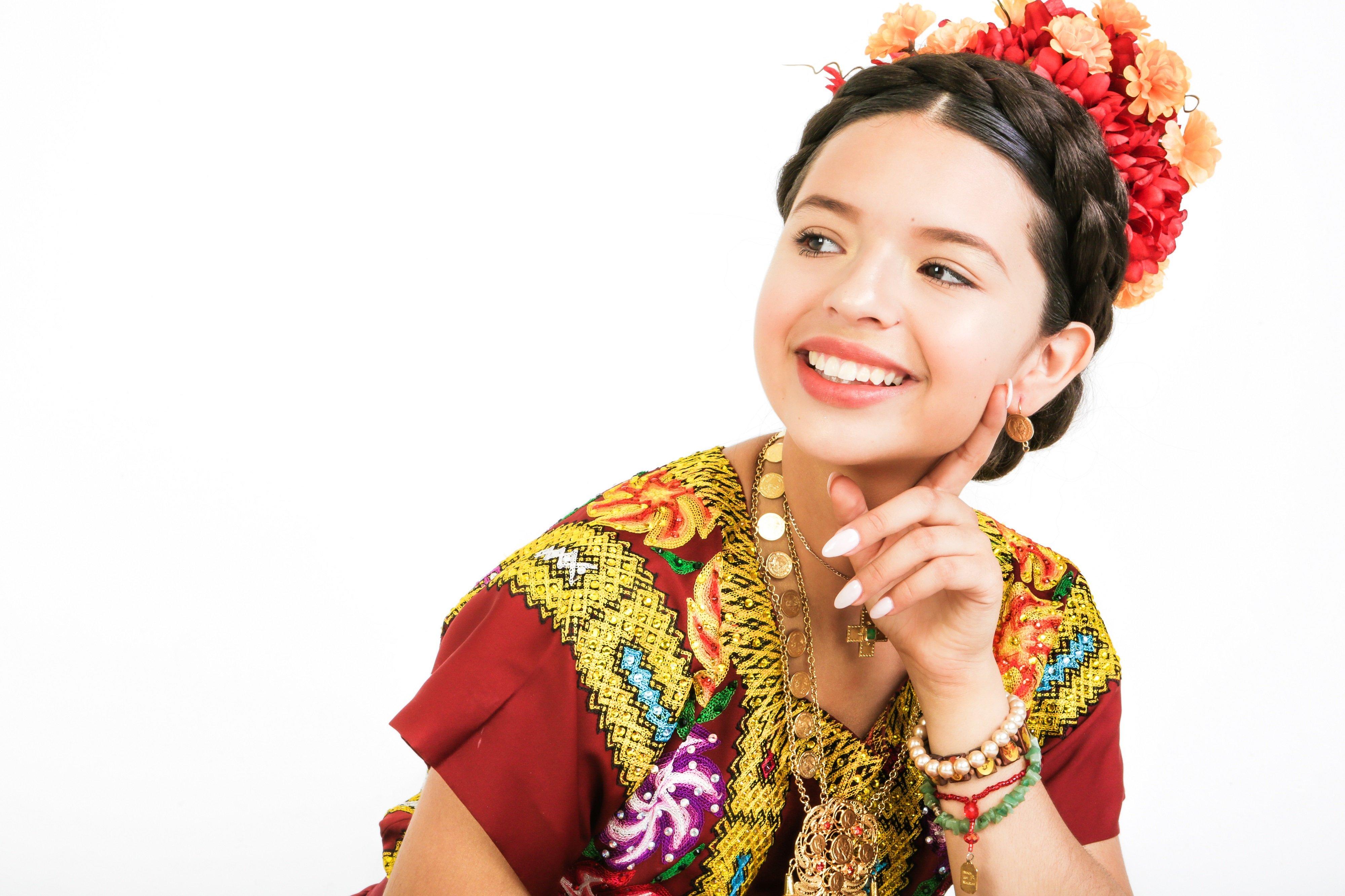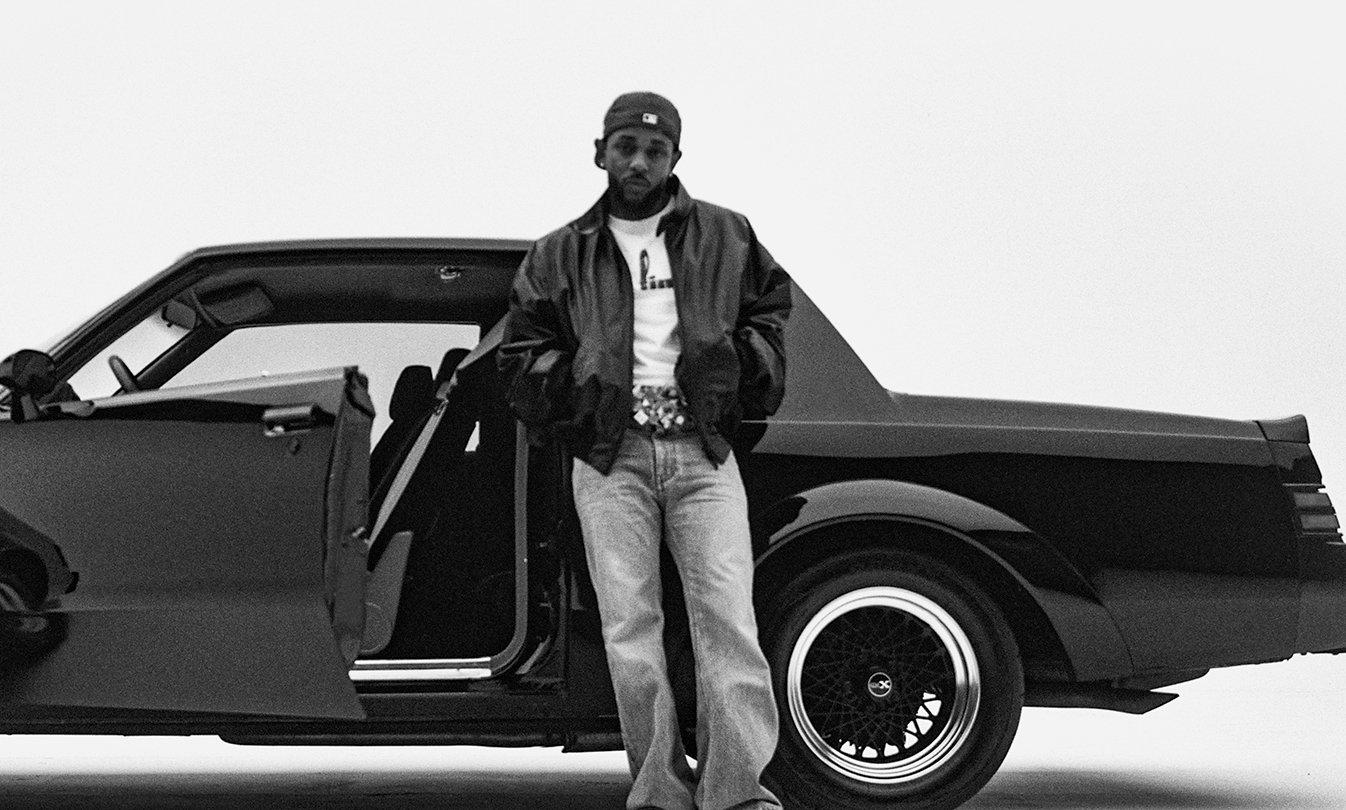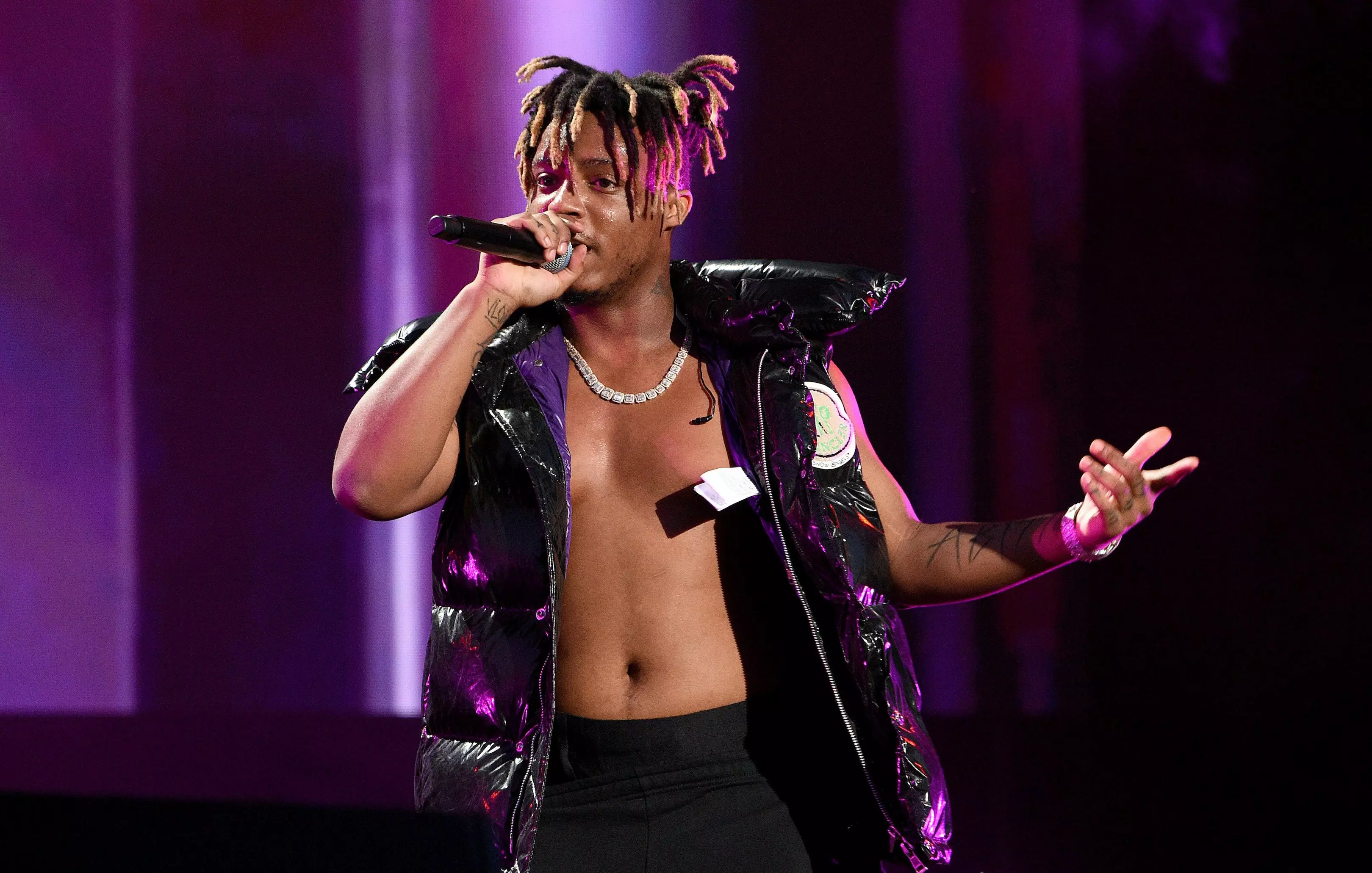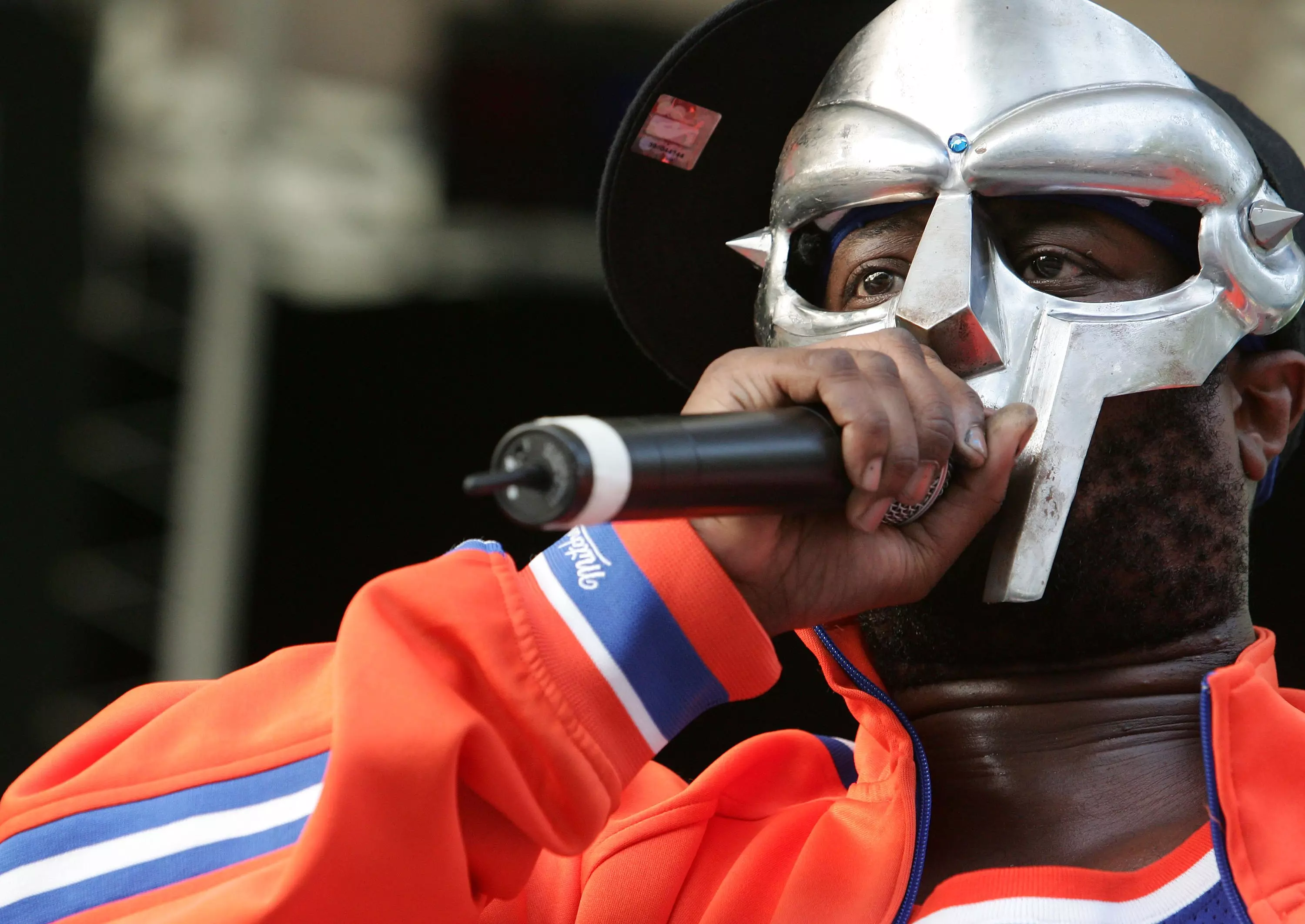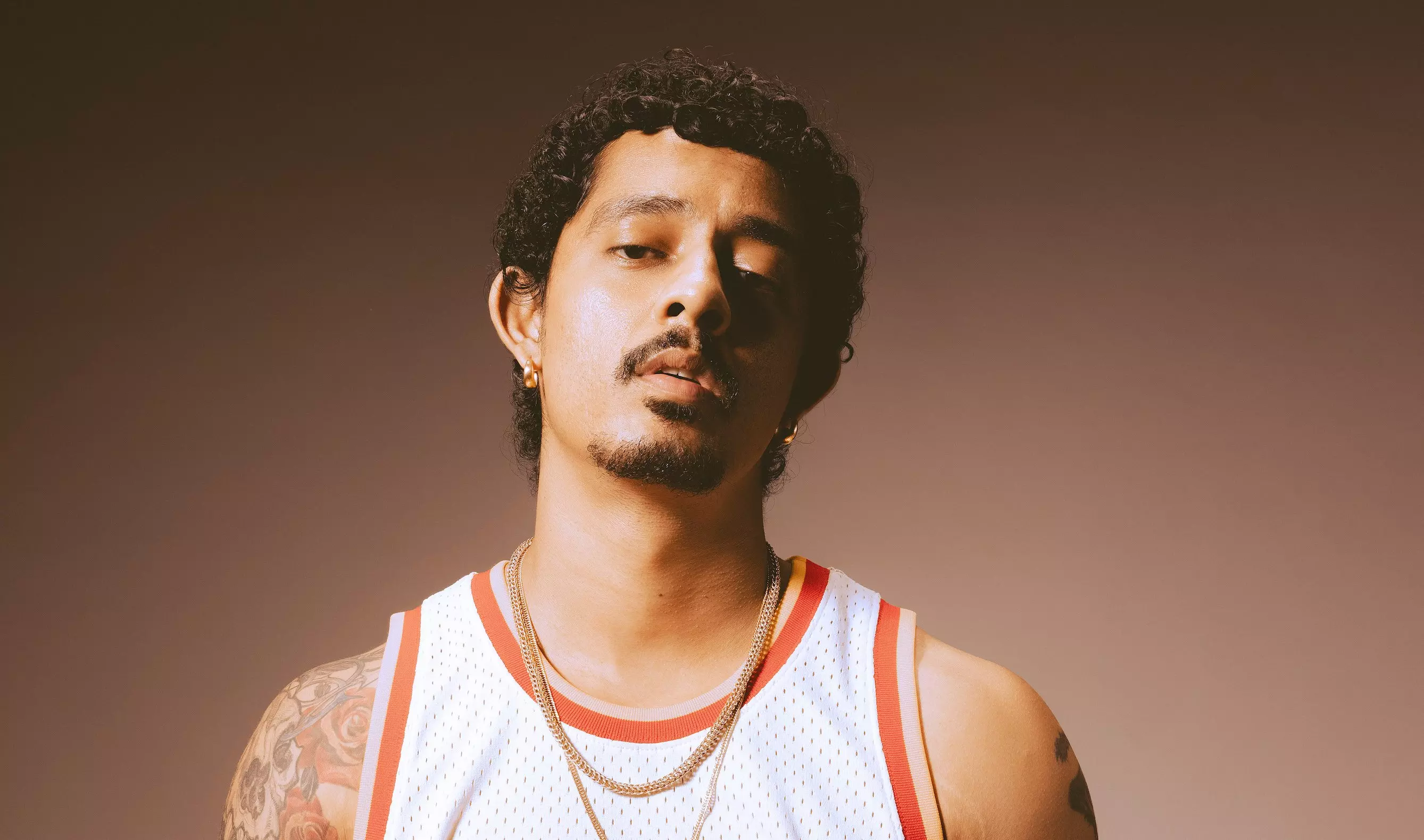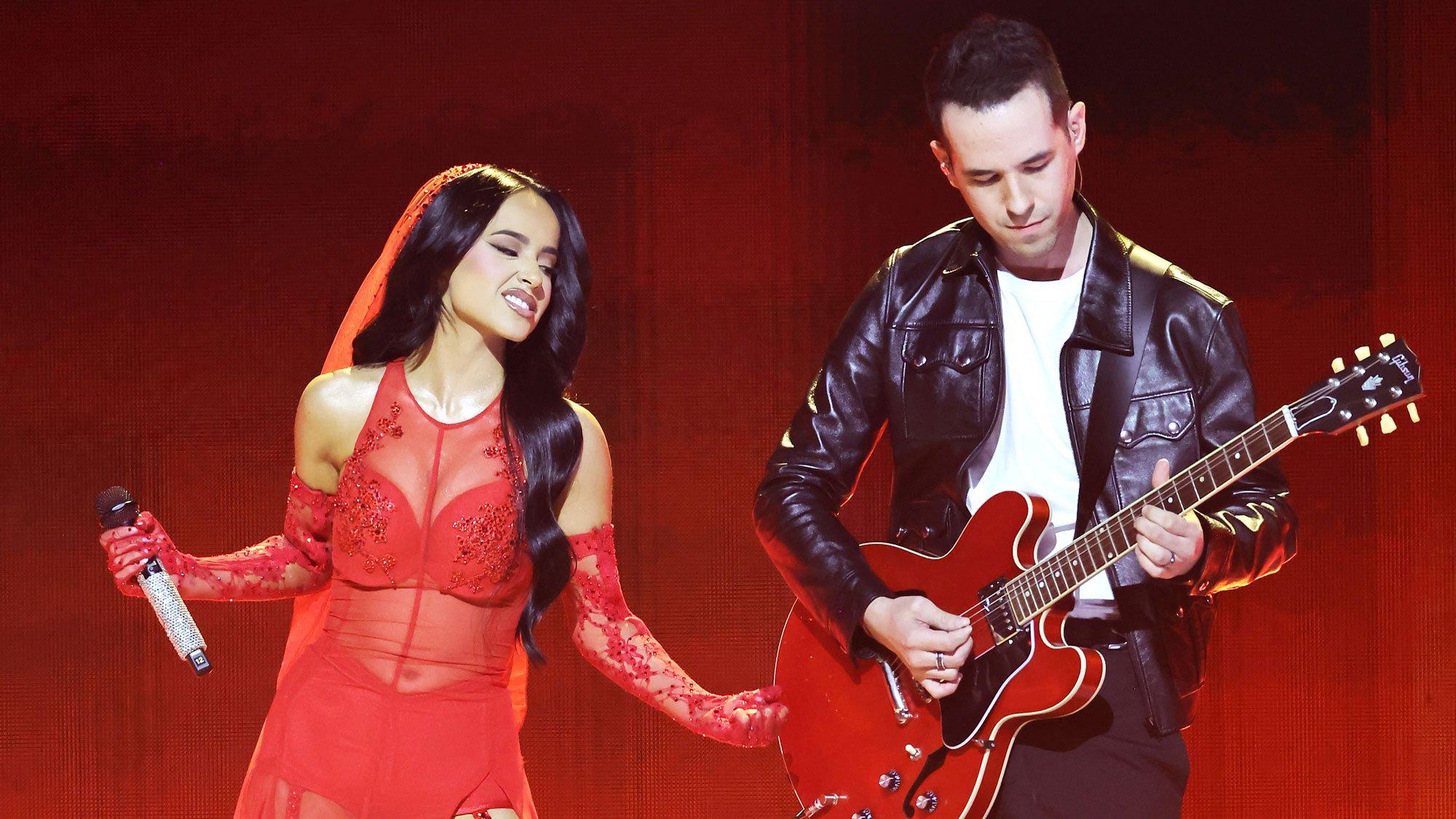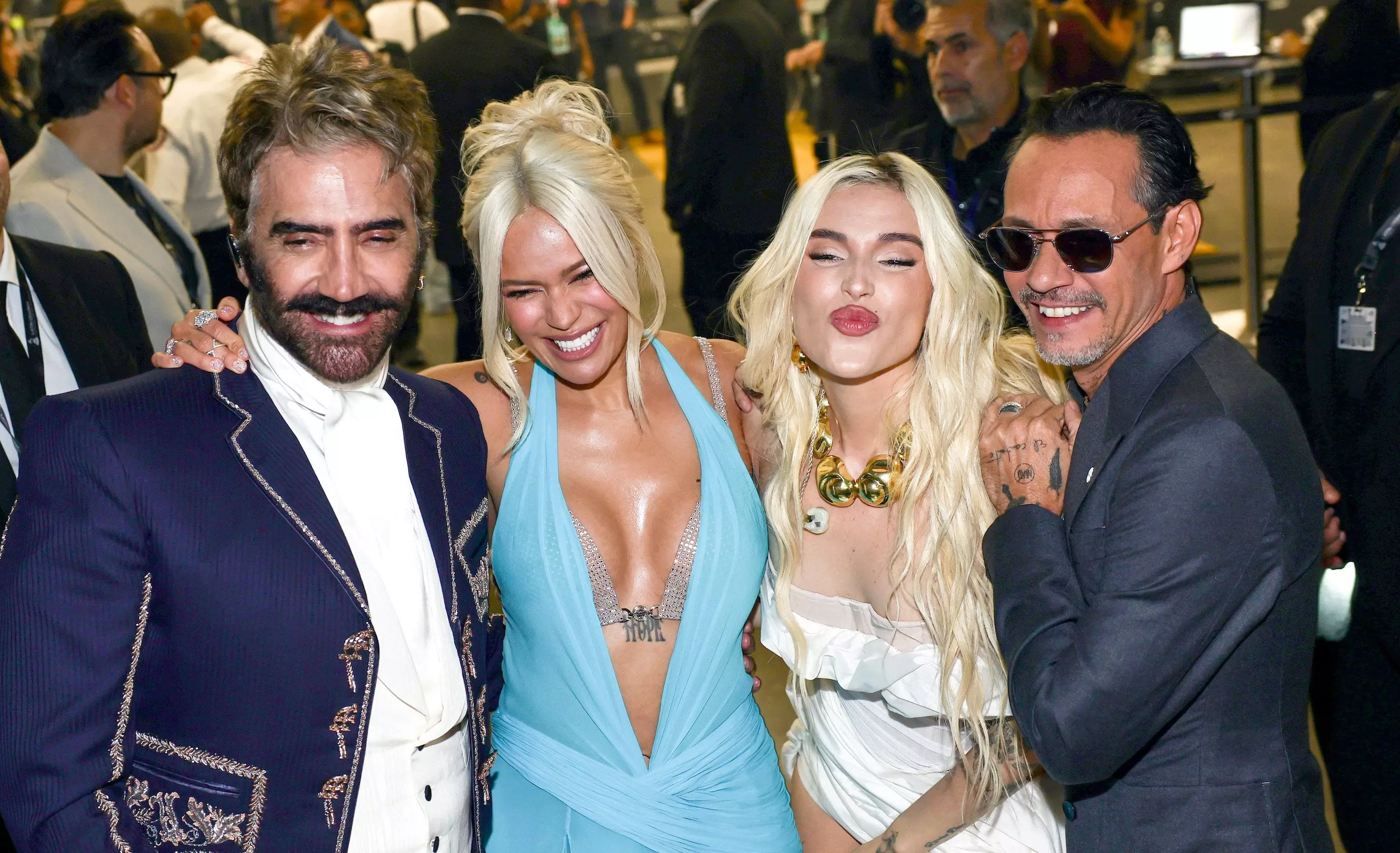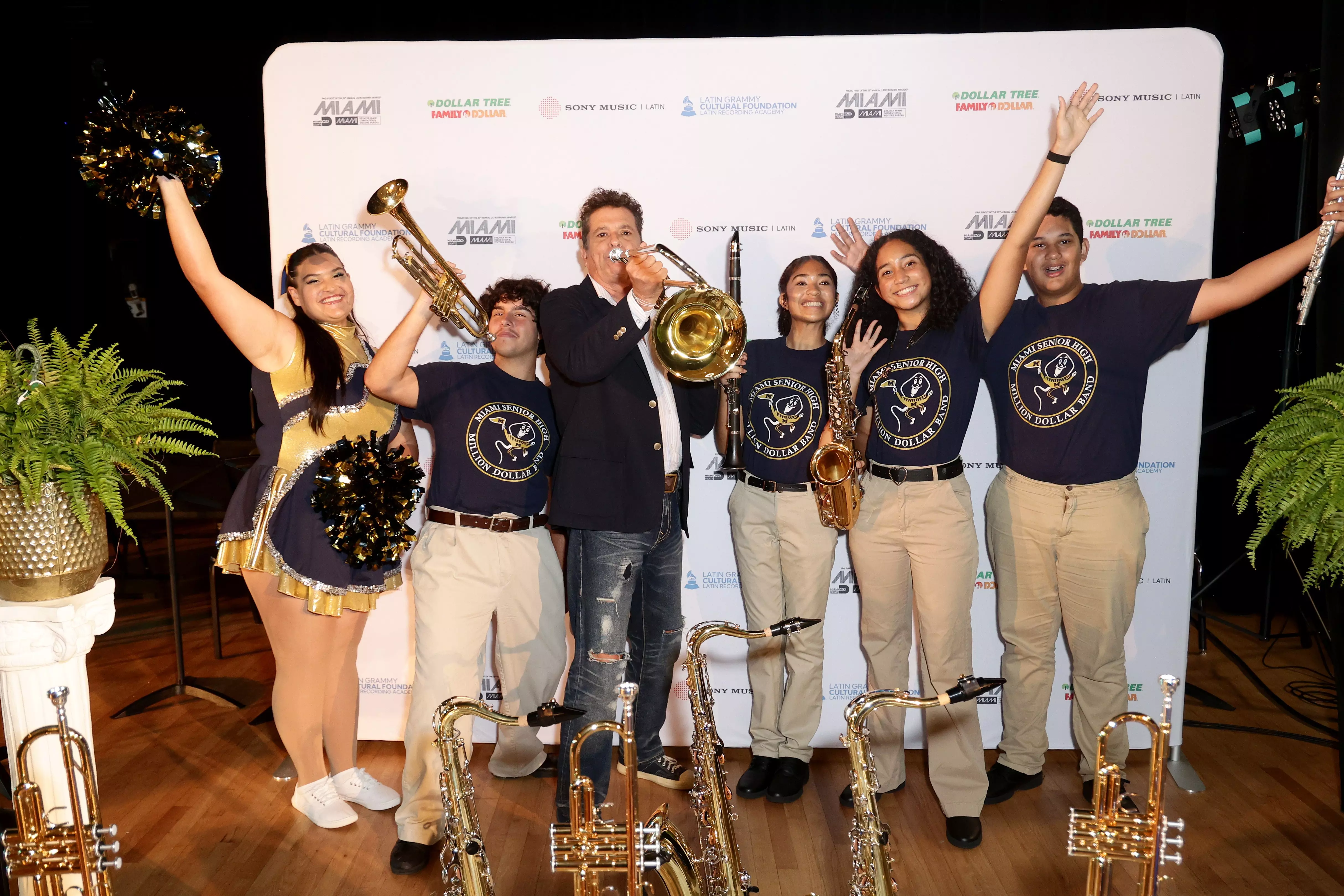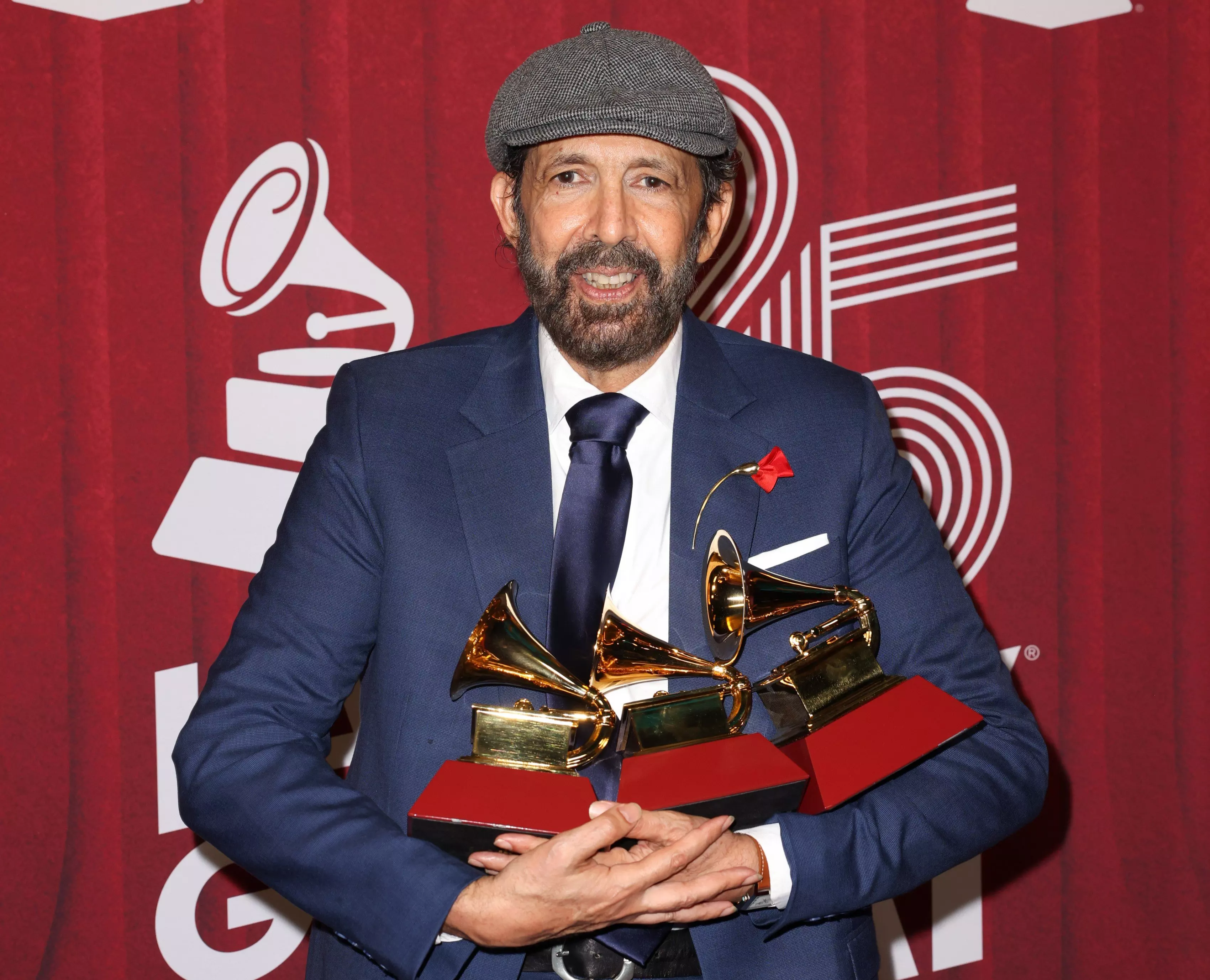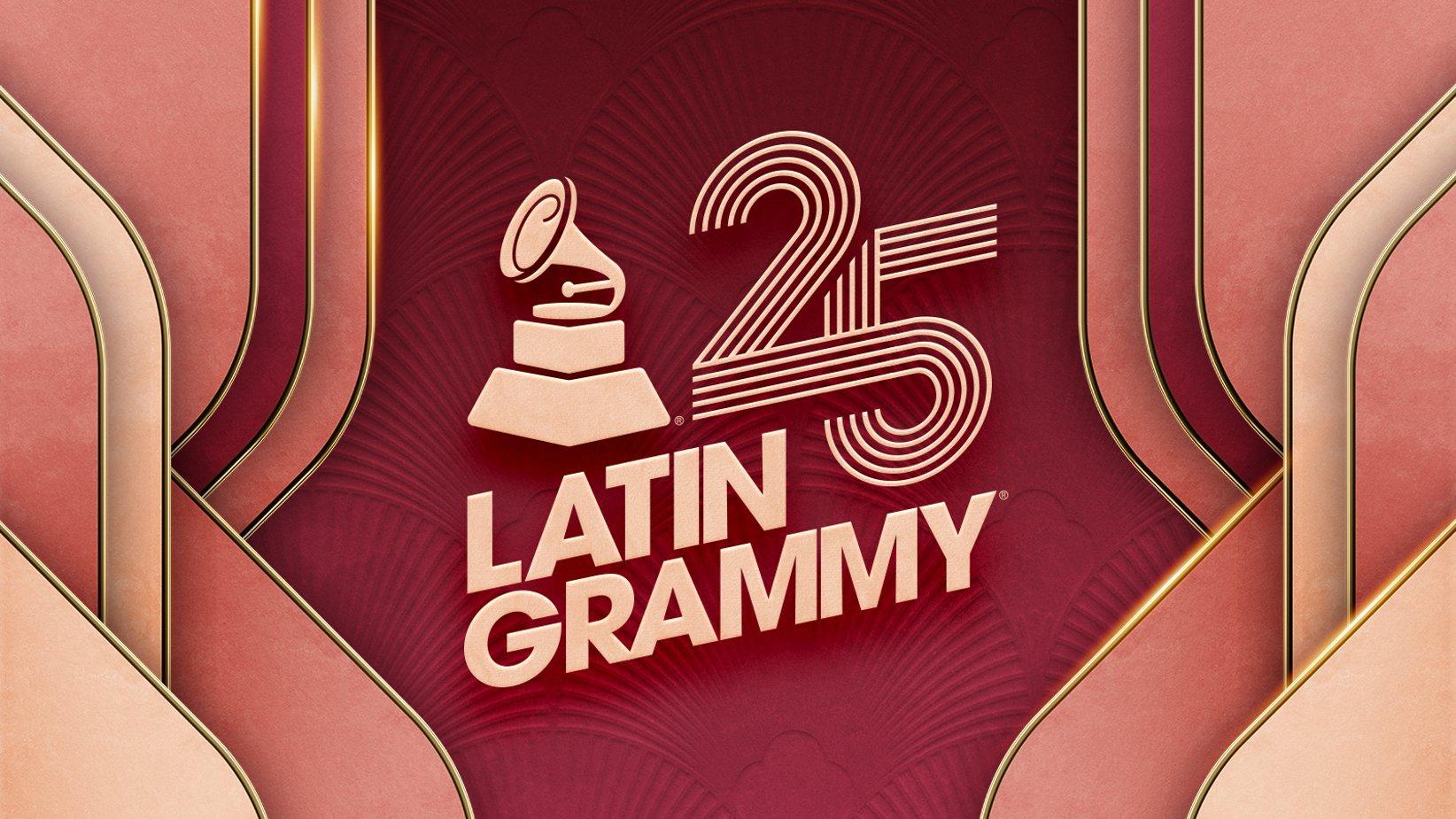At only 15 years old, Angela Aguilar talks about music with the wisdom of someone much older. It might be because since she was a child she's been crooning some of the most heavy-hearted kinds of Spanish language songs of all time: ranchera.
"Ranchera music does something to you that I don't think a lot of genres can do," she says enthusiastically. "Some songs are made to listen to in the background, some songs are [made] just to dance to, some songs are [made for you] to feel something and I feel like almost every ranchera song is made for you to feel something."
<iframe width="620" height="349" src="https://www.youtube.com/embed/D0WiO8q16ow" frameborder="0" allow="accelerometer; autoplay; encrypted-media; gyroscope; picture-in-picture" allowfullscreen></iframe>
Singing ranchera, i.e., traditional Mexican music from the countryside that is sometimes sung with mariachi, is in her blood. Aguilar's father is GRAMMY-winning mariachi singer/songwriter Pepe Aguilar. Her grandfather was the late GRAMMY-nominated master mariachi singer and Mexican Cinema Golden Era actor Antonio Aguilar. Her grandmother is the prolific Mexican singer and actress Flor Silvestre.
Her family's legacy inspired Aguilar at a very young age to sing. Her first time on a stage was at the age of three in front of 80,000 people on one of the pit stops on her grandfather's last tour. At seven, she went into a recording studio to record Whitney Houston's classic ballads "I Will Always Love You" and the "Wind Beneath My Wings."
She may be entertainment royalty in Mexico, but the Mexican-American singer is swiftly carving out a unique space for herself in the music world: She has a Latin GRAMMY performance under her belt and is one of the youngest artists to ever be nominated for a Latin GRAMMY and GRAMMY.
Aguilar spoke the Recording Academy about her first GRAMMY nomination for Best Regional Mexican Music Album (Including Tejano), what it takes to be singer at such a young age, and how proud she is to represent her culture through song.
How did you find out about your GRAMMY nomination? How did you feel when you found out?
I was waking up to go to school and my sister ran into my room started jumping on my bed, like, "Angela you have to look at this." I didn't even know the GRAMMY nominations were that day. I never even thought I was gonna get nominated. So when my sister came to me I was completely, completely shocked. It was like, I don't know, 6 AM, and I was with my parents running up to their room, going and telling them.
It was super, super cool because I've always seen the GRAMMYs, and I've always related them to my father[.] My father has [four] American GRAMMYs and he has four Latin GRAMMYs, so like whenever I thought of a GRAMMY I thought of him. I always used to go with him to all the awards ceremonies and everything, so this time it was like wow, it's my turn now.
You're a Mexican-American artist singing in Spanish. You were nominated for two Latin GRAMMYs, now you're nominated for a GRAMMY. What do these nominations mean to you?
I didn't start to sing because I wanted to get GRAMMYs or [because] I wanted to get awards or anything. I started singing because I really like music and it's been my passion since I was two years old.
The first time I was on stage in front of like 80,000 people was when I was three, and I sang a little part of a song and it started becoming, not a routine, but it started becoming a treat for me of when I was a little kid. It was amazing.
As I started growing, I started accompanying my dad to all his different shows. Last year we sold over 400,000 tickets worldwide in different shows and arenas and everything. It's been a true blessing to be able to be Mexican-American and to be a woman and to be recognized in an industry filled with so many talented artists.
It's pretty crazy to be nominated for an award of this caliber at 15. I'm still so small and it's just crazy to be nominated next to my heroes like, Luis Miguel. He's such a powerful artist, he's one of my dad's friends. He's such an inspiration to me. He started when he was very, very little as well.
Why did you decide to name your GRAMMY-nominated album Primero Soy Mexicana?
Well, because I am Mexican-American. I was born in Los Angeles, I have a house over there. I have a house in Mexico. Half of the year I'm in Mexico, half of the year I'm in the States, and it's so, so cool to be American and to be bilingual and to have dual citizenship. But at the same time, I'm Mexican. That's where I came from, it's in my veins, that's why I sing the songs that I do. I'm honoring my ancestors and the traditions that my grandfather and my grandmother have led me to follow. So before anything, before being American, I'm Mexican, and I'm proud of it.
<iframe width="620" height="349" src="https://www.youtube.com/embed/h5z99EYHY4I" frameborder="0" allow="accelerometer; autoplay; encrypted-media; gyroscope; picture-in-picture" allowfullscreen></iframe>
Speaking of your culture, you wore an indigenous huichol corset at the Latin GRAMMYs, and you highlight your culture through your dresses when you perform. Why is it so important for you to share your culture with the world?
Because I feel like our culture is what makes us. How can you be someone different? How can you change who you are if you don't know who you are? It's like, you're trying to find your own way, but you don't even know where you came from. You always need to know where your road starts, and I think my road is starting with my traditions, with very, very important things that my ancestors left me for a reason.
When I was nine years old, I sang a song called "La Chancla." It's a very, very old song that my grandfather used to sing. And before my grandfather it was another artist. It's basically a song about a person that used to love someone and they don't anymore. And it's me at nine years old singing "La Chancla." I didn't even understand it, but I felt so proud to sing something that my grandfather was singing and to perform stuff that represented my country.
Sometimes when people think of Mexico they don't necessarily think of all the beautiful things and the culture and the food and everything. They think about the negative things, which also are there. You cannot be blind to the negativity, but you cannot let it control you. That's why I perform with very big and sparkly dresses that are very, very in honor of my culture. But at the same time, they're my dresses. I add Swarovskis, I add mesh, and I add crinoline. I add so many things that make the dress me because it's really cool to honor your culture, but at the same time you have to honor yourself.
What made you want to follow in your family's footsteps and be a professional musician?
When I was little, whenever I went on a train or a plane or a bus, I would try to mimic the same sounds or the same vibration that the airplane was doing. My love of music started growing, growing, growing. And I went into my first recording studio when I was seven. I recorded a Whitney Houston song, "I Will Always Love You," and then I also recorded "The Wind Beneath My Wings." [Those songs have] some powerhouse vocals. It's always been my thing. I really like doing harmonies and I love doing runs. I do sing Mexican music, but that's not all I listen to. Of course I can name 20,000 artists, but I can also tell you about Lady Gaga, I can tell you about the Rolling Stones, about Pink Floyd, Coldplay. I like to have a lot of tools so that when I sing certain types of music, it can still be a worldwide thing.
So Latin music, specifically urban Latin music, is getting very popular here in the U.S. Would you ever consider performing something in that realm?
I don't really know. I have a lot of friends that are in that, like Becky G is very close with me. I'm pretty good with all of the people that sing that genre, and I think it's very cool, I think it's very respectable. I love dancing with it, it's very fun to see how many things they can come up with and the new dances and everything. But right now I'm just not focused on stuff like that. I just wanna focus on what I'm doing right now, which is just mariachi. And if the opportunity comes or if we decide to do a collaboration with somebody or something, that would be super, super cool.
RELATED: Meet First-Time GRAMMY Nominee: TOKiMONSTA On Why 'Lune Rouge' Is "A Celebration Of Life"
Do you at all feel pressured to live up to your family's legacy?
I don't feel pressured. I feel like it's a big responsibility. Honestly, being an Aguilar, having that last name means a lot, especially in Mexico. I think it's something I can use to grow as an artist and as a singer and as a person, because I never want to let [my family] down. So I'm just working on myself, I'm working on my product.
It's really cool that they're still with me. My grandfather passed away 10 years ago, but my grandmother's still with me and my father's still with me. It's really cool because they help me all the time. Every single time I get off the stage, my dad tells me how I can improve myself, and that's helped me a lot.
Tell me, what is it that you love about singing ranchera music?
I just feel like every song is a story. The songs that I sing, they all have meaning.
I was talking to a director, today actually, about how whenever I sing a happy ranchera song I get happy, and whenever a sing a sad and depressing, heartfelt breakup song, I get super sad to the point of where I can start crying. And yes, I'm a very sensitive person because I'm an artist, but ranchera music does something to you that I don't think a lot of genres can do, which is it makes you feel. I feel like almost every ranchera song is made for you to feel something.
What is one thing you want for people in the U.S. to know about you as an artist?
I want them to know that it's okay to be young in the industry, because it is gonna be harder for you. I'm 15, and it's hard to be doing school and to be singing and to be on finals, and the next day I have a performance or I have an awards ceremony to go to. It is hard, but it's worth it, if that's what you love.
And I think to the parents, and to just older people in general, I just wanna say that young artists can be as responsible and respectable as people that are older. The arts should not have an age where you can start or where you should stop. I feel like anyone can do it at anytime at any age.
RELATED: Meet The First-Time GRAMMY Nominee: Protoje On Evolving Reggae
You've already accomplished so much at just 15. What's next for you?
I'm probably gonna do an album with my songs that I [write the] lyrics [for]. I think that's gonna be next for me. I think maybe start branching out, maybe start singing in different languages. I don't wanna stop growing, ever.
What are you most looking forward to the most at the 61st GRAMMY Awards?
I don't even know. If I win, I'm gonna be super happy, but if I lose it's not gonna define me. I saw this movie called A Star is Born where Lady Gaga performs, and that was one of the best things I've ever seen. I haven't cried that much in a movie since, like, Bambi. I feel like if I see her I'm gonna kind of have like a starstruck moment. I never get starstruck because I've been in the industry for so long, and I live in Los Angeles. It's everywhere. But with her I think I might get a little antsy.

